- Faculty News
- Student News
- Lab News
- Publications
- Meetings and Presentations
- Outreach
- Grants
- Announcements
- About This Newsletter
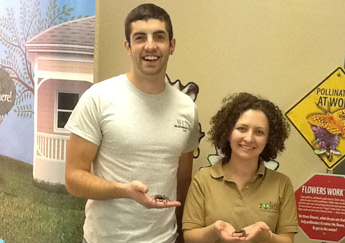
ABOVE: Two graduate students Lucas Carnohan and Amanda Eiden from the Kaufman lab representing the Department at the Florida State Fair in Tampa.
The Hulcr lab worked with FDACS-DPI to run a small workshop on identification of bark beetles on February 5th for students and staff. Led by Craig Bateman, Kate Okins (FDACS-DPI) and Jiri Hulcr, we had eight people representing three departments.
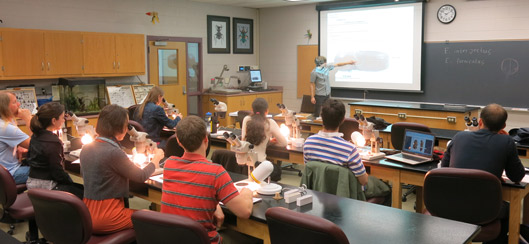 ABOVE: In three intense hours, each participant learned how to identify around 20 of the most common species of bark beetles in Florida. The specimens (well over a hundred) were kindly loaned to us from the DPI collection.
ABOVE: In three intense hours, each participant learned how to identify around 20 of the most common species of bark beetles in Florida. The specimens (well over a hundred) were kindly loaned to us from the DPI collection.
Dr. Christine Miller gave an invited talk at the 35th annual Winter Animal Behavior Conference in Steamboat Springs, CO on January 24th. The title of her talk was "Genotype-by-Environment Interactions and Sexual Selection."
Dr. Christine Miller is helping students to embrace the creative process of science and research, bringing together education and hands-on research experience in the classroom setting. The Department has added Undergraduate Research, a section of ENY4905, to our program. The course was first taught in Spring 2012 and was designed to teach students the processes of science and research. Read more about this program in the latest edition of CALS Connection.
Dr. James P. Cuda travelled to Vicksburg, MS, from the 24th to the 25th of January, to conduct a joint research project on hydrilla IPM with Dr. Judy Shearer, a plant pathologist located at the Army Engineer Research and Development Center.
Dr. James P. Cuda was invited to attend an appreciation dinner hosted by Senior Vice President Dr. Jack Payne at the Straughn IFAS Extension Professional Development Center on the 16th of January. IFAS faculty and staff were honored for their participation in the UF Water Exhibit that was displayed in Washington, DC, last summer and also at the Harn Museum last fall.

We are very happy to announce the addition of two new members in the Entomology and Nematology family.
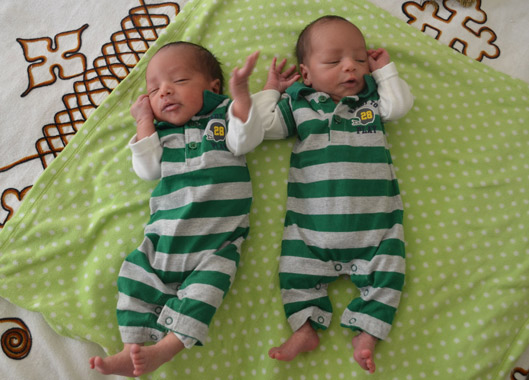
ABOVE: Dr. Tesfa Mengistu and his wife Hanna's boy/boy twins: Kaleb and Nahom. They came to the family on January 15th at 4:52 and 4:53 PM, respectively. Kaleb weighed 6 pounds 3 oz and Nahom weighed 5 pounds 14 oz.
Dr. Corraine McNeill’s dissertation is the department’s nomination for the Award of Excellence in Graduate Research in CALS for 2012 (i.e., best dissertation). She will receive the Mulrennan award ($1,000) from the Department to recognize her achievement. Her dissertation was entitled "Investigation of biological and educational factors for bed bug management," and Dr. Phil Koehler was her supervisor. Corraine is competing in the CALS’-wide competition, which will be announced at the IFAS Research Awards ceremony later this spring.
 CALS Dean’s List
CALS Dean’s List
Listed below are 11 Entomology and Nematology students who made the CALS Dean’s List for Fall 2012. Genevieve E. Comeau is also on the President’s Honor Roll. Congratulations to these students!
Genevieve E. Comeau, James C. Fleming, Keith M. Gerber, Abigail M. Griffin, Mary Elizabeth Hampe, Jade Amanda Hilliard, Christopher R. Lewis, Casey Parker, Anthony Tyler Riggio, Sigal Andre Szejner, and Sabrina A. White.
 Students: Jobs, Internships, and Future Plans
Students: Jobs, Internships, and Future Plans
Paula Cohen, a UF Entomology and Nematology senior, has been accepted to the UF Dental School for fall 2013.
Josh Fonzi, UF Entomology and Nematology class of 2012, has been accepted to medical school.
Sabrina White, a UF Entomology and Nematology junior, has received a summer internship to conduct research in Thailand.
Casey Parker and Sabrina White have been selected for the CALS Leadership Institute.
Aaron Pomerantz, an M.S. student in the Hoy Lab, was chosen to participate in USDA’s Outlook Forum Student Diversity Program. He will attend USDA’s Agricultural Outlook Forum from February 21st to 22nd in Arlington, Virginia.
 Alumni: Jobs and Future Plans
Alumni: Jobs and Future Plans
Dr. Jason Meyer, Entomology and Nematology Alumni (Ph.D., 2007, graduate from the Hoy Lab), has accepted a position at Monsanto Company in Chesterfield, MO. Job Title: Insect Control Team Lead-Entomology, working on genomics/insecticide discovery for control of key crop pests.
Dr. Amit Sethi, Entomology and Nematology Alumni (Ph.D., 2007, graduate from the McAuslane Lab), has accepted a Research Scientist position at DuPont Pioneer Hi-Bred in Johnston, Iowa. Amit is a part of the Insect Resistance Management Science (IRMS) group that is a research function accountable for delivering applied science necessary for the global registration and stewardship of new and commercial insect control traits. Amit will contribute research expertise and novel problem solving to a team responsible for managing the durability of insect control traits. Amit and Ramandeep are expecting their second baby in the first week of July. Their daughter Millie, who was born in Gainesville, is now a kindergartener!
Dr. Hardev Sandhu, Entomology and Nematology Alumni (Ph.D., 2010, graduate from the Nuessly Lab), has been selected for a tenure-track Assistant Professor (Sugarcane Agronomist) position at the UF-IFAS, Everglades Research and Education Center (EREC), Belle Glade, Florida, with 60% research and 40% extension.
Dr. Rajinder (Raj) Mann has accepted a permanent Research Scientist Position with MN Department of Agriculture. His work will primarily involve special pesticide registration reviews. Dr. Mann worked as a Post Doctoral Associate in three of our labs; he worked with Dr. Dave Schuster (retired) at the Balm REC, with Dr. Phil Kaufman on campus, and with Dr. Lukasz Stelinski at the Citrus REC in Lake Alfred.
 Geometric Morphometric Tool Package (GMTP)
Geometric Morphometric Tool Package (GMTP)
Geometric Morphometric Tool Package (GMTP) can be used by entomologists to handle outline data collected from insect specimens. Such data can be extracted from different body parts (head, thorax, wings, legs, etc.) to identify and compare closely related species or conspecific populations (pestiferous/non-pestiferous species). GMTP is a program for data conversion, size calculation (centroid size, area, perimeter), shape drawing, shape super-imposition, and image cropping for outline data.
Siavash Taravati, a Ph.D. student in Dr. Catharine Mannion's Lab at UF-TREC, has developed this computer program. He will give a seminar on this topic at TREC on February 21st.
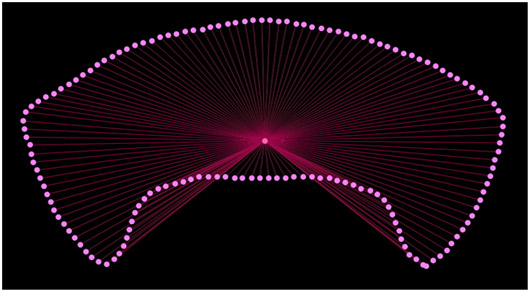
ABOVE: An image produced by GMTP from the outline data of the pronotum of the beetle Erodiontes aelleni (Coleoptera: Tenebrionidae).
 On January 23rd, Ph.D. student Richard Baidoo from the Crow Lab presented results from his research on IPM of root-knot nematodes on pittosporum to the Volusia County cut foliage growers in Pierson, Florida.
On January 23rd, Ph.D. student Richard Baidoo from the Crow Lab presented results from his research on IPM of root-knot nematodes on pittosporum to the Volusia County cut foliage growers in Pierson, Florida.
Need to name that bug? A host of experts are available to help Floridians identify any insect or related arthropod. If a mystery creature has six or more legs, the UF Insect ID Lab is the place to call. Lyle Buss is the Insect ID Lab manager.
Nearly all of the 29 samples received in January were collected indoors. They included several kinds of ants, silverfish, a few stored-product pests, and a couple of wood-destroying powderpost beetles. Next month Lyle expects to start hearing about ground-nesting bees in the families Andrenidae and Colletidae. These bees like to nest in sandy areas in lawns where grass is sparse. They are not aggressive toward people, but homeowners get uneasy when dozens of these bees are active in a small area.

Think it might be a nematode problem? The Nematode Assay Laboratory serves Florida and other states by providing nematode assay and expert advice regarding nematode management. For more information on the Nematode Assay Laboratory please contact the Lab Manager Dr. Tesfa Mengistu.
Alto BW, Wasik BR, Morales NM, Turner PE. 2013. Stochastic temperatures impede RNA virus adaptation. Evolution doi: 10.1111/evo.12034. This publication has generated some news intrest.
Chouvenc T, Efstathion CA, Elliott ML, Su N-Y. 2012. Resource competition between two fungal pathogens in subterranean termites. Naturwissenschaften 99: 949-958.
Crow WT. 2013. Bionematicides for Florida lawns and landscapes. Florida Pest Pro 9 (1):14-15.
Grafton-Cardwell E, Stelinski LL, Stansly PA. 2013. Biology and management of Asian citrus psyllid, vector of huanglongbing pathogens. Annual Review of Entomology 58: 413-432.
Overholt WA, Cuda JP, Markle L. 2012. Can novel weapons favor native plants? Allelopathic interactions between Morella cerifera (L.) and Schinus terebinthifolius Raddi. Journal of the Torrey Botanical Society 139: 356-366.
Stelinski LL, Gut LJ, Miller JR. 2013. An attempt to increase efficacy of moth mating disruption by co-releasing pheromones and kairomones and to understand possible underlying mechanisms of this technique. Environmental Entomology 42: 158-166.
Walker TJ, Funk DH. 2012. The scientific names of two common Florida crickets (Orthoptera, Gryllidae). Florida Entomologist 95: 936-938. See more information on the little cricket, and the big cricket.
 New on Featured Creatures:
New on Featured Creatures:
We are launching a new look. We hope you like the new layout and functions!
Do you have a favorite creature? Learn how to make it into a Featured Creature!
The 3rd International Research Conference on Huanglongbing was held in Orlando, Florida at the Caribe Royale Hotel February 4th to the 8th.
Doctoral student Scott Croxton and Dr. Philip Stansly, presented a poster, "Metalized polyethylene mulch to reduce incidence of huanglongbing and improve growth of new citrus plantings."
Dr. Jawwad Qureshi, Barry Kostyk, and Dr. Philip Stansly, presented their research, "Synthesis results from eight years of field testing insecticides against Asian citrus psylid Diaphorina citri vector of huanglongbing: Considerations and Implications."
Dr. Cesar Monzo, Dr. Katherine Hendricks, Dr. Pam Roberts, and Dr. Moneen Jones and Dr. Philip Stansly, presented their individual research, “Thresholds for HLB vector control in infected commercial citrus and compatibility with biological control” and "Frequent Low Volume Sprays of Horticultural mineral Oil (HMO) for Asian Citrus Psyllid Control", respectively, as poster presentations. Dr. Jones and Dr. Stansly also provided, "Extension Model to Improve Asian Citrus Psyllid Control in Citrus Health management Areas (CHMAs)", as an oral presentation.
Dr. Philip Stansly, Dr. H. Alejandro Arevalo, Dr. Jawwad Qureshi, Dr. Moneen Jones, Dr. Katherine Hendricks, Dr. Pamela Roberts, and Dr. Fritz Roka presented a talk, "Vector Control and Foliar Nutrition for Management of Huanglongbing in Florida Citrus" and poster, "Soil applied Systemic Insecticides for the reduction of HLB in newly planted citrus trees."

Dr. James Cuda, Dr. William Overholt, and Dr. Rodrigo Diaz were co-authors on a presentation titled "Biological control of Brazilian peppertree: moving towards field releases." The paper was presented at the 17th Annual Southwest Florida Invasive Species Workshop held on the campus of Florida Gulf Coast University, 11 December 2012. The presenter was Dr. Veronica Manrique, one of Cuda’s former Ph.D. students.
Dr. James P Cuda was invited to participate in an interagency planning workshop on Brazilian peppertree statewide biological control efforts. Cuda gave a presentation titled "Biological Control Research at UF: Current Status of a Moth, Weevil and Psyllid Imported from Brazil."
In January, Dr. Billy Crow gave presentations on Nematode IPM to golf course superintendents and lawn care professionals at Florida Turfgrass Association regional seminars in Ocala, Ft. Myers, Plantation, and Ft. Pierce.

Caribbean Bee College Report
The first Caribbean Bee College (CBC) was held at St. George’s University in Grenada, January 4th to the 6th. The CBC was made possible through a partnership of the Honey Bee Research and Extension Lab at the University of Florida, St. George’s University (SGU), the Association of Caribbean Beekeepers’ Organizations (ACBO), and the Grenada Association of Beekeepers (GAB).
A team of six from United States included David Westervelt and Gary Van Cleef from FDACS and Dr. Bill Kern, Dr. Jamie Ellis, Jeanette Klopchin, and Bo Sterk, Master Beekeeper Program (UF). Our international speakers included Dr. Valma Jessamy of GAB, Mr. Roy Murray of the Jamaica Federation of Commercial Apiculturists, and Mr. Aubrey Roberts of ACBO (Guyana).
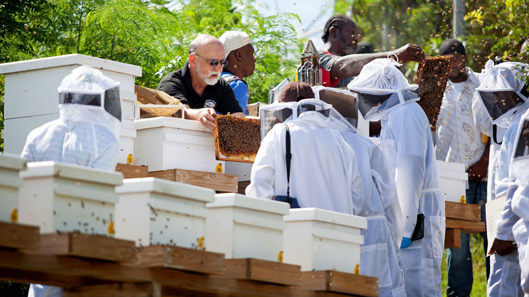
ABOVE: Our team hosted beginner and advanced classes on a variety of honey bee topics with lecture halls filled with 70 people from 12 nations in attendance.
The CBC opening was attended by the Prime Minister of Grenada, Honorable Tillman Thomas, and the Governor General, Sir Carlyle Glean. Having government officials at his level attending showed the commitment to beekeeping in the Caribbean.
The CBC hosted a round-table discussion with representatives from each island in attendance. Here they shared information regarding future needs in extension, research, and instruction. We will use this informatin as a platform for future planning. We are happy to report a successful pilot extension event in the Caribbean and are looking forward to hosting the CBC annually.
Getting Social
We have several social media sites for the Entomology & Nematology Department. To make them easily searchable, all three (YouTube, Facebook and Twitter) have the same page name, UFEntomology. Please share these links with past students or colleagues who may have an interest in departmental activities.
The DPM program would like to invite our newsletter readers to like their Facebook page to keep up with DPM events and developments. Be sure and "Like" the DPM Facebook page.
Honey Bee Research and Extension Laboratory wants you to follow them on twitter to find out about upcoming events and interesting stories about honey bees @UFHoneybeelab.
 From the Outreach Coordinator
From the Outreach Coordinator
The Florida State Fair will be held from February 7th to the 18th this year at the Florida State Fairgrounds in Tampa. The Department’s booth will be in the Florida Agriculture Hall of Fame and will be part of the Florida Entomological Society's Insect Encounters.
Dr. James P. Cuda was invited by the Cedar Key Garden Club to give a presentation on his research at the Cedar Key Library, 2 February. The title of Cuda’s presentation was "Progress on Biological Control of Brazilian peppertree." Note: Cedar Key residents have been attempting to eradicate Brazilian peppertree for many years with limited success.
The live critters are always a hit with children and adults alike. The critters are available for you to check out should you be leading an outreach event. We have doubles of our most popular critters, as well as various native insect species depending on the time of year. We have large wood and Plexiglas cages for viewing our native orb weaving spiders. There is one travel cage and one larger static cage. Please be sure to contact us and review the protocol on transporting and handling the critters if you are not already familiar with it. If you lead an outreach, be sure to fill out a documentation form so your event can be included in the newsletter and we can log all outreach events.
If you would like to schedule an event or have any outreach questions, go to the Outreach pages on our Bug Club Website and contact us. I look forward to working with all of you over the next four years.
- Stephanie Stocks, Outreach Coordinator
- Office number 352-273-3958
Virni Mattson, our Grants Specialist, reports that January 1st to 31st, 2013, we have had eight new grants or contracts awarded for a total of $602,610 in external funding for all Entomology & Nematology faculty (in Gainesville and at RECs). This impressive total does not include the awards listed below!
 Entomology graduate student Lindsy Iglesias, along with Dr. Oscar Liburd, is using a $10,837 Southern Sustainable Agriculture Research and Education (SSARE) Graduate Student Grant to develop an IPM program to manage the spotted wing Drosophila (Drosophila suzukii) – a vinegar fly related to the common fruit fly.
Entomology graduate student Lindsy Iglesias, along with Dr. Oscar Liburd, is using a $10,837 Southern Sustainable Agriculture Research and Education (SSARE) Graduate Student Grant to develop an IPM program to manage the spotted wing Drosophila (Drosophila suzukii) – a vinegar fly related to the common fruit fly.
 UF/IFAS 2013 Early Career Seed Grants
UF/IFAS 2013 Early Career Seed Grants
Dr. Barry Alto. Effects of larval competition on vectorial capacity of dengue vectors.
Research Funding: $49,683
Professional Development Plan Funding: $3,412
Dr. Jiri Hulcr. Understanding beetle-fungus symbioses through new technologies.
Research Funding: $49,576
Professional Development Plan Funding: $4,996
Dr. Christine Miller. Social networks in an agricultural pest, the squash bug.
Research Funding: $49,883
Professional Development Plan Funding: $5,000
Master Beekeeper Program- March 7th
The Master Beekeeper Program (MBP) is a five-year beekeeper training and certification program provided by the University of Florida. One must already be a beekeeper to enter the program. Entry into the program is attained by meeting the Apprentice requirements and passing the Apprentice examinations on exam day. There is no age limit for entry into the program, although the examination may be difficult for children under 12 years of age.
Registration for March 7th at Marineland (ticket purchasing): http://springmasterbeekeeperprogram.eventbrite.com/
 UF Bee College- Friday and Saturday March 8th and 9th
UF Bee College- Friday and Saturday March 8th and 9th
The most extensive educational honey bee event in the state of Florida is back for its sixth year! Everyone is welcome to attend Bee College: beekeepers, naturalists, farmers, gardeners, county faculty, and anyone interested in bees! This two-day event offers lectures in the morning and hands-on workshops in the afternoon. We have live honey bee colonies on site for open hive demonstrations and protective gear for everyone.
With over 50 classes running over two days and participation of over 250 people, Bee College is the best time you could have learning about honey bees!
Registration (ticket purchasing) http://beecollege.eventbrite.com/
 Honey Show and Honey Judge Certification Program
Honey Show and Honey Judge Certification Program
The Bee College Honey Show is the largest in the state, and winners can proudly claim the title of “Best Honey in Florida!” All honey show entries are due by 10AM on Friday March 8th.
The Bee College Honey Show provides a wonderful opportunity to showcase all of your (and your bees'!) hard work. Despite the name, the Honey Show isn’t just for honey! You can submit honey products, art/photography and beekeeping artistry. A “Best of Show” will be chosen from all of the 1st place winners. It is important that you read all of the following rules regarding the UF Bee College Honey Show. Entries can be disqualified for failure to adhere to any of the requirements. Please consult our new Honey Show Schedule and the new Rules and Regulations for submission guidelines.
 2013 Southeast Pest Management Conference
2013 Southeast Pest Management Conference

We are ready for you! The registration for the 2013 Southeast Pest Management Conference - "Special Pest Ops" is open. Check the website. You can register online and check what we have scheduled for the conference. We will see you here in Gainesville on May 5th to the 8th!

The 96th Annual Meeting of the Florida Entomological Society
FES will be held July 14th to the 17th at the Waldorf Astoria Hotel in Naples, Florida. Hotel Reservations at the FES rate ($129.00) via a website link will be available in late January.
Symposium proposals are currently being accepted. Any FES member who would like to organize a symposium or workshop for the annual meeting should e-mail (preferable), phone, or fax their suggestions to Program Chair, Dr. Nan-Yao Su by February 14.
Dr. Nan-Yao Su, Ft. Lauderdale Research & Education Center, 3205 College Ave. Davie, FL 33314. Phone: (954)577-6300, Fax: (954)475-4125.
Dr. Jennifer Gillett-Kaufman is the newsletter editor and does the HTML coding. Issues usually are published by mid-month. Submit items for an issue by the 7th of that month.
We like to share news when it happens using our social media outlets- Twitter, Facebook and YouTube. Follow us on these sites for daily updates! When you send news, we will post it on one or more of these sites and again in the monthly newsletter. Please be sure you have permission from people in photographs you submit for publication.
UF-Bugnews-L listserv subscribers receive notices when issues are posted. Our home page has instructions for subscribing and unsubscribing.
Special thanks to Dr. Verena Lietze and Nancy Sanders who reviewed the newsletter for errors and to Jane Medley who built the web page.